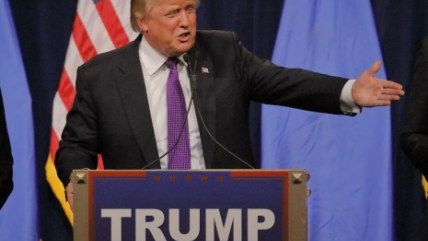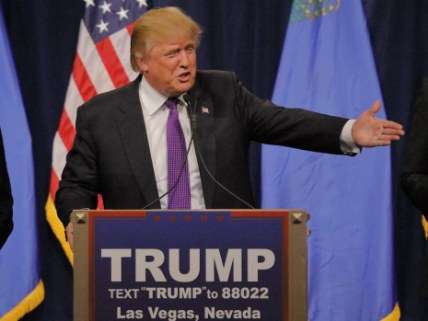Trump's Continuing War on His Own Credibility
Twitter fights aren't a replacement for well-formulated policies.


Asked about Melissa McCarthy's portrayal of him on Saturday Night Live, White House press secretary Sean Spicer had some advice for the actress: "Dial it back." May I suggest the president adopt that phrase as his administration motto?
So far, Donald Trump has made it a practice to obliterate every known limit and pump up every grievance. Harvard law professor and former Reagan administration official Charles Fried, marveling at the president's Twitter volleys at federal judges, said, "There are no lines for him. There is no notion of, this is inappropriate, this is indecent, this is unpresidential."
Trump may think: Hillary Clinton acted presidential, and what did it get her? He, by contrast, ran a campaign seemingly engineered to prove how unpresidential he was. But a majority of voters—sorry, a minority of voters—nonetheless elevated him to the White House.
It would not be impossible for Trump to take his campaign themes and turn them into a reasonably workable and defensible agenda for his presidency. It would consist of cracking down on unauthorized immigrants, renegotiating trade deals, rolling back regulation, beefing up the military, reforming the tax code and fixing the Affordable Care Act.
Racking up a few accomplishments from that list and avoiding any foreign policy disasters, combined with a strong economy, would set him up nicely for re-election. Not blowing things up would be enough to assuage doubts.
But Trump likes blowing things up, and he clearly figures that what worked for him on the campaign trail will work for him in the Oval Office. Campaigning, however, is theater. Governing is real life, which requires grappling with arduous practical matters. The difference is roughly akin to cheering for Tom Brady versus blocking for him.
Trump's fondest admirers grant him considerable latitude. A September Washington Post/ABC News poll found that only 48 percent of his supporters actually believed his vow that Mexico would pay for a wall on the southern border. But they liked the aggressive tone of his promise and the purpose it captured. If he were to take visible measures to get rid of some undocumented workers, most of his fans would count that as vindication.
After his surprise election victory, his former campaign manager, Corey Lewandowski, said journalists had erred because they "took everything that Donald Trump said so literally." But Trump himself doesn't always seem to know when he's merely exaggerating for effect. His response to the court decisions that went against his travel ban suggests he was flabbergasted to learn he can't unilaterally do everything he wants.
Nor does Trump seem to realize that what works in front of an adoring crowd may fall flat with a larger audience. Talking about banning Muslims during the campaign served him well. But formulating policy requires deliberation and care. The travel ban, implemented in haste, caused chaos and hardship that made the president look like a callous bungler. It also forced the courts to step in.
Vilifying judges merely because they rule against him doesn't help. Jack Goldsmith, a high Justice Department official under George W. Bush, wrote that Trump's intemperate tweets "will make it very, very hard for courts" to grant the president the latitude on these matters that they have in the past. He'll get no benefit of the doubt from judges who feel obliged to show they can't be cowed.
Nor does it accomplish much for him to blast away with abandon at anyone else who challenges him. Grown-up voters are not going to humor a leader who claims that journalists are conspiring to hide terrorist attacks. Falsehoods like that one could eventually push his credibility over a cliff.
When you have the lowest approval rating of any new president on record, you need to do more than pander to your most rabid defenders. Every time Trump embarrasses his more rational allies with his over-the-top antics, he saps their willingness to work with him.
He got away with defending Vladimir Putin last year. But going so far as to equate U.S. policies with the Russian dictator's—"What, you think our country's so innocent?"—infuriated members of his own party. He gave Republicans in Congress new reason to ponder what a fine president Mike Pence would be if Trump were impeached and removed.
It can be strategically shrewd for a leader to occasionally breach boundaries and violate conventional standards. Push too far or too often, though, and you can soon become a laughingstock.
© Copyright 2017 by Creators Syndicate Inc.


Show Comments (171)